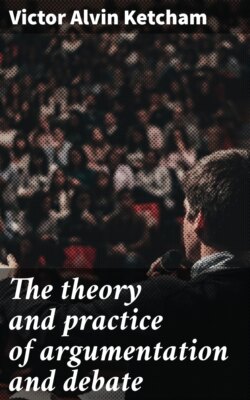Читать книгу The theory and practice of argumentation and debate - Victor Alvin Ketcham - Страница 19
На сайте Литреса книга снята с продажи.
3. The proposition should contain no ambiguous words.
ОглавлениеAfter the proposition has been narrowed down to a single idea and has then been stated in the affirmative, it should be carefully scrutinized in order to determine whether it contains any ambiguous words. Ambiguous words have a meaning so broad that they may be taken in more than one sense. Such a word is “Anarchist.” This word may refer to a lawless individual bent on assassination, or to a peaceable individual who has merely the beliefs of an anarchist with no intention of putting them into practice. Almost all general terms such as “Anarchist,” “Monroe Doctrine,” “Civilization,” “Policy,” and “Trusts,” should be avoided because they tend to make the proposition ambiguous. When such terms are used they should be almost invariably accompanied by explanatory words. The words selected for use in the proposition should have but one meaning and should be so plain that there can be no reasonable dispute as to their significance. If this rule is not complied with the discussion will become a foolish quibble over the meaning of the proposition rather than an intelligent debate upon the merits of the question.
In the question, “Resolved, that trusts should be suppressed by law,” there are three ambiguous words, (1) trusts, (2) suppressed, and (3) law. While these words may not be ambiguous in ordinary speaking or writing, they are not sufficiently definite to be used in a proposition. The word “Trust” has several meanings and several shades of meaning. Among these is the meaning which has recently been given to it, indicating a combination of firms engaged in some special line of business, as for example, “The Sugar Trust”, “The Oil Trust”, “The Steel Trust”, etc. Even this one meaning has different variations. The term “trust” as used in this sense may refer to a mere combination of manufacturers, to a monopoly, or to a monopoly in restraint of trade. In order to make the meaning of the proposition clear we may strike out the ambiguous term “trusts” and insert “monopolies in restraint of trade.”
The word “suppressed” in this connection may have two well defined meanings. It may mean either destruction or regulation. If the intent is that the question shall hinge on whether or not monopolies in restraint of trade should be destroyed or wiped out altogether, the word “dissolved” or “destroyed” should be used. If, on the other hand, it is intended that the issue shall be whether such organizations be allowed to exist in their present form, but subject to governmental regulation which will suppress their evil effects on trade, the word “regulated” should be used. For the purpose in hand let us choose the latter meaning.
The term “law” is also somewhat ambiguous, because there is more than one legal agency which could deal with such organizations. Therefore we will make plain which agency is intended by modifying the word “law” by the word “Federal.” This makes the proposition, as corrected, read, “Resolved, that monopolies in restraint of trade should be regulated by Federal law.” The proposition as thus worded is fairly free from ambiguity and leaves little opportunity for quibbling over the meaning of the words in which it is stated.
The proposition must be so worded as to have the same meaning for both the affirmative and the negative, and this meaning must be absolutely clear and unambiguous.
